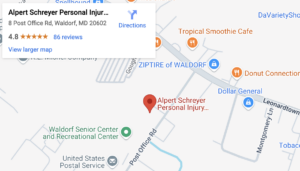
When someone is injured due to an accident or negligence in Maryland, they may be entitled to compensation for their losses. While economic damages like medical bills and lost wages are straightforward, non-economic damages can be more complex to understand. In this article, we’ll explain what non-economic damages are, how they are calculated, and how they differ from economic damages in personal injury cases under Maryland law.
What Are Non-Economic Damages?

Non-economic damages refer to compensation awarded for intangible losses that don’t have a direct financial value. These damages are designed to compensate the victim for the emotional, mental, and physical suffering they experience as a result of an accident or injury. Unlike economic damages, which can be calculated based on receipts, bills, or wages, non-economic damages require an evaluation of the harm done to the individual’s quality of life.
Key Types of Non-Economic Damages
There are several types of non-economic damages you might be entitled to in personal injury cases. Common types include:
- Pain and suffering: This is perhaps the most commonly discussed form of non-economic damage. It refers to the physical discomfort or agony that results from an injury. It can include the pain experienced from broken bones, surgery, or chronic pain caused by long-term injuries.
- Emotional distress: Emotional distress is another major category of non-economic damages. This type of compensation accounts for the mental anguish someone may experience after an injury. Examples include anxiety, depression, fear, and PTSD (Post-Traumatic Stress Disorder), all of which can arise from accidents or traumatic events.
- Loss of consortium: Loss of consortium refers to the loss of companionship, affection, and support that a person’s spouse may experience due to their injury. If an accident leaves someone unable to maintain a romantic or physical relationship or even hinders their ability to perform normal daily activities, their spouse may be entitled to compensation. Under Maryland law, a spouse can file for loss of consortium if their partner’s injury significantly impacts their relationship or ability to interact physically.
- Loss of enjoyment of life: When an injury causes a person to lose their ability to enjoy life in the way they once did, they may be entitled to damages for loss of enjoyment. For example, someone who can no longer participate in activities they loved before the injury—such as hiking, swimming, or playing sports—may be compensated for this loss.
- Disfigurement or scarring: Physical disfigurement or scarring due to burns, accidents, or surgery can have long-lasting emotional and social effects. Non-economic damages may be awarded to compensate individuals for the negative impact these scars have on their self-esteem and social interactions.
Speaking with a personal injury lawyer will give you the best idea of what kinds of non-economic damages you might be entitled to.
How Are Non-Economic Damages Calculated?
Calculating non-economic damages can be challenging since there are no concrete figures like medical bills or lost wages to consider. Courts usually rely on a combination of factors, including the severity of the injury, the impact on the victim’s quality of life, and the length of recovery.
However, because non-economic damages are subjective, there’s often room for negotiation, and the final amount can vary greatly depending on the case, the severity of the injury, and the legal strategy involved.
How Do Non-Economic Damages Differ from Economic Damages?
Understanding the difference between non-economic and economic damages is key when seeking compensation for an injury. While economic damages cover tangible, verifiable losses, non-economic damages are meant to address the more abstract consequences of an injury.
Economic damages include:
- Medical expenses (hospital bills, doctor visits, medications)
- Lost wages or income due to an inability to work
- Property damage (e.g., car repairs after an accident)
- Future medical expenses
In essence, economic damages have a clear financial value, while non-economic damages are designed to compensate for the more personal and emotional impacts of an injury.
Limitations on Non-Economic Damages
In Maryland, non-economic damages are subject to caps in certain circumstances. For instance, in medical malpractice cases, the amount of non-economic damages a plaintiff can receive is capped by law, as mentioned above. However, these caps do not apply in all types of injury cases, and the value of non-economic damages can depend heavily on the specifics of each case.
For cases outside of medical malpractice, Maryland courts have discretion in awarding non-economic damages, and juries are responsible for determining the amount based on the evidence presented. Skilled personal injury lawyers can help ensure that non-economic damages are properly calculated and maximized under the law.
Why Are Non-Economic Damages Important?
Non-economic damages are essential because they address the non-financial consequences of an injury, which can be just as life-altering as physical harm. For many victims, their pain and suffering can last long after the physical injuries have healed. Non-economic damages offer a way to bring a sense of justice and recognition for those intangible losses.
Additionally, these damages act as a deterrent for negligent behavior. By holding responsible parties accountable for the emotional and psychological harm they cause, courts help promote a culture of safety and awareness.
When Can You Pursue Non-Economic Damages?
If you’ve suffered an injury due to someone else’s negligence—whether from a car accident, a slip and fall, medical malpractice, or any other incident—you may be entitled to non-economic damages. To successfully pursue these damages, you’ll need to prove that the injury caused significant non-financial harm to your life. Consulting with a personal injury attorney can help you understand the specifics of your case, how non-economic damages may apply, and the best way to pursue them in court.
Contact a Personal Injury Attorney for Help
Non-economic damages are a vital component of compensation in personal injury cases. Although these damages can be difficult to quantify, they address the deep emotional, mental, and physical impact an injury can have on a person’s life. Whether you’re dealing with pain and suffering, emotional distress, or a loss of enjoyment in life, non-economic damages can help you get the compensation you deserve.
If you’re navigating a personal injury case in Maryland, it’s essential to work with an experienced attorney who can advocate for the full range of damages you may be entitled to.


